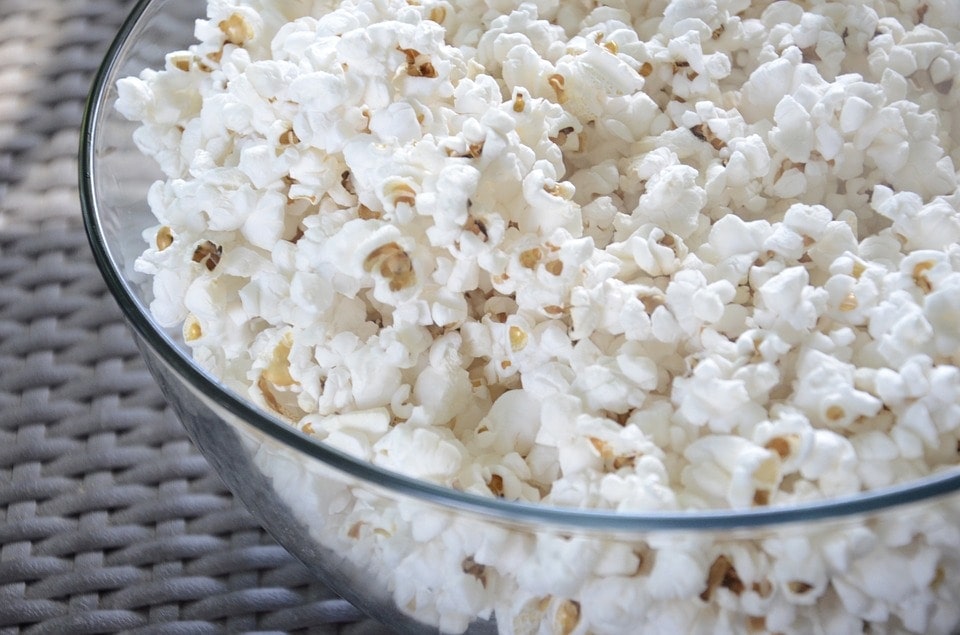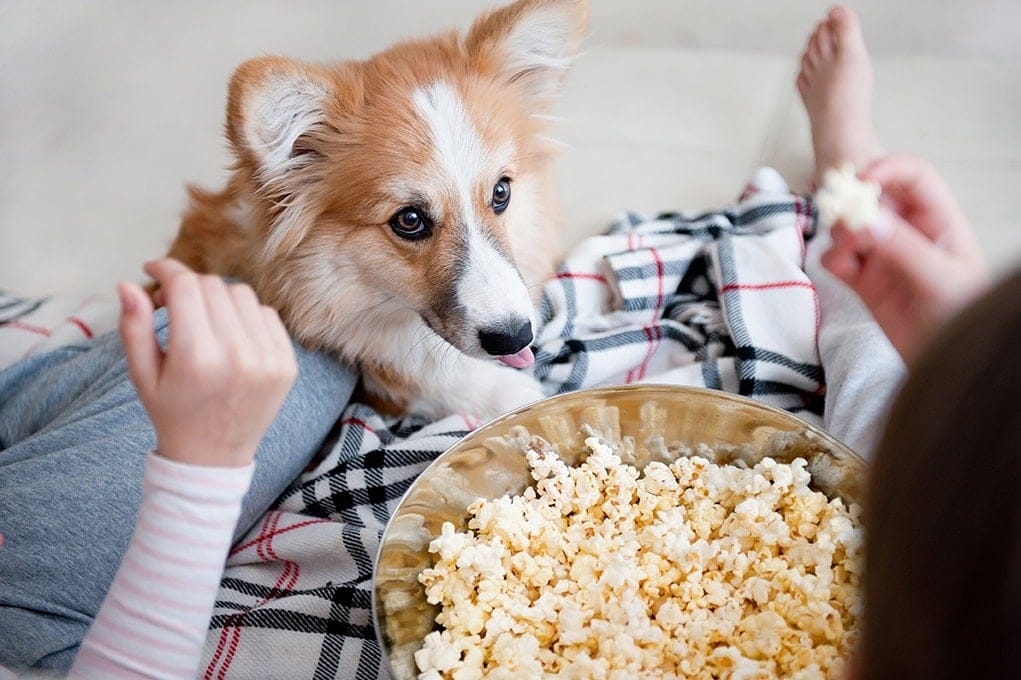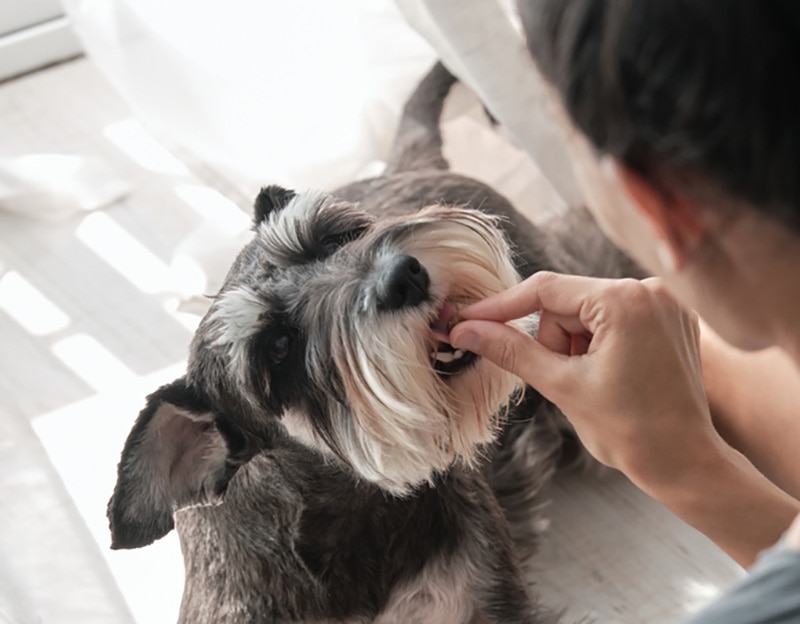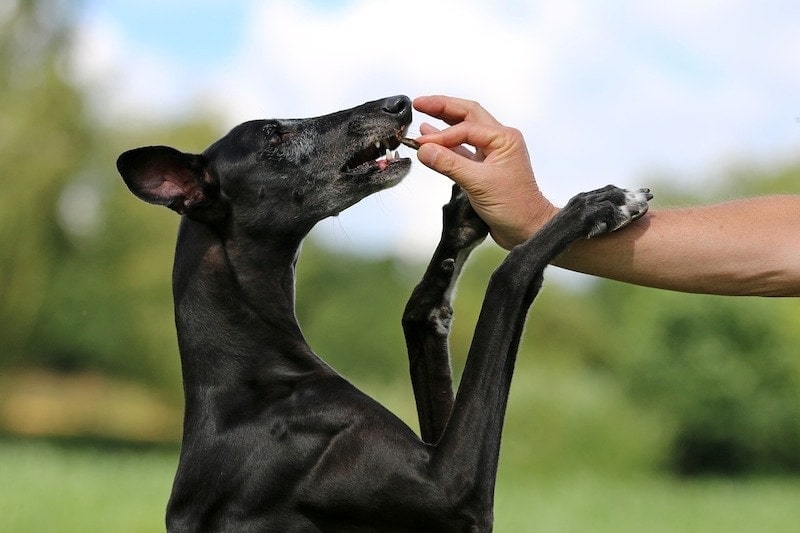Can Dogs Eat Popcorn? Vet-Reviewed Safety Guide

Updated on

It never fails: You curl up to watch a movie on Saturday night, and just when it starts getting good, you hear whining — and see puppy-dog eyes.
Yep, your dog wants some of your popcorn.
But should you share? The answer is complicated, but it’s probably better if you reserve this one snack just for you. While plain popped popcorn itself is generally safe for most dogs, it comes with a few precautions.
To find out why popcorn can be bad for your dog — as well as when it can be okay — read on.
Is Popcorn Safe for Dogs?
To answer this question properly, we have to divide the popcorn into three parts: unpopped kernels, popped kernels, and toppings.
Plain, unsalted popped kernels are generally fine for dogs. They do have poor nutritional value, but for the most part, they’re just a tasty treat.
Unpopped kernels are not nearly as safe. They can crack a dog’s tooth if they’re chomped on, can cause mouth or throat injuries, lead to choking especially in small dogs, or sometimes, in rare cases, may even lead to an obstruction in the bowels if a large amount was ingested, so it’s a lose-lose proposition.
The toppings are also bad for dogs. Butter is extremely high in fat, which could lead to a stomach upset, particularly in dogs that are lactose intolerant, same as cheese. Likewise, salt is bad for dogs in large amounts, although it would take quite a lot of popcorn to cause issues.
Generally, it’s unlikely that a piece or two of popcorn that landed on the floor and got scooped up by our pooch will cause them any significant health issues. A different story is if the popcorn is prepared with additives such as garlic or onion flavorings, or artificial sweeteners like xylitol, all of which are toxic to dogs and should be avoided. Speak to your vet if your pooch ate popcorn with any of these additives.

Are There Any Health Benefits to Eating Popcorn?
These are quite limited and are mostly not worth mentioning. Popcorn is rich in carbs, which isn’t a good food choice for diabetic dogs, and it should not be given regularly to healthy dogs either.
There’s a little bit of fiber, as well as B vitamins, protein, and iron. However, your dog would have to eat a large amount to see any health benefits from it, and those would be counterbalanced by the issues noted above.
So, while popcorn has a few vitamins and minerals in it, don’t look at it as a healthy food for your pup.

Are There Any Other Dangers to Be Aware Of?
Yes, a big one: the bag.
The bag is possibly the most dangerous part of having popcorn around, at least as far as some dogs are concerned. Dogs, especially smaller breeds, can get their heads stuck inside the bag while rooting around for spare kernels, licking away the excess left overs of salt and other harmful ingredients.
Additionally, your pup may be tempted to eat the bag, especially if it’s coated in butter. This can lead to an obstruction in the stomach or the bowels that may require surgery and lead to further serious health complications. Intestinal surgery always carries risks which may lead to sepsis in some cases and should not be taken lightly.
Beyond that, the only other major concern is the oil you popped the popcorn in, assuming that you used any. Be sure to dispose of it promptly and safely, or else your dog could burn themselves or experience digestive issues from eating it.
What Are Safe Alternatives to Popcorn for Dogs?
Although you can give your dog plain, popped kernels in moderation — just be sure to pick out all the unpopped ones first, there are better treat alternatives for your pooch. Only offer popped kernels on special occasions, don’t make it a regular snack, and consult with your vet first if your dog is diabetic or suffers with digestive or pancreatic health issues. In such cases, foods high in carbs and starch, such as popcorn, or those with very fatty ingredients, may not be appropriate for your pooch.
You should mainly focus on feeding your pet dog-appropriate treats. While they may not want to hear it, dogs don’t need popcorn, so you’re not being mean by saying no. There is a big choice of commercial dog snacks, from various appropriate ingredients such as meat and fish, dog-safe, xylitol-free peanut butter treats, and many more.

So, What’s the Verdict? Can Dogs Eat Popcorn?
Yes, dogs can eat plain, unsalted popcorn and limited amounts of the regular stuff, but there’s no reason to share this snack with your pup.
It has limited nutritional value, and there’s always the chance that your dog could get injured if they get into the bag or come across a stray unpopped kernel. Butter and cheese can lead to a stomach upset, while garlic, onion, and xylitol are all toxic to dogs, and should be avoided at all cost.
Featured Image Credit to: Pixabay












